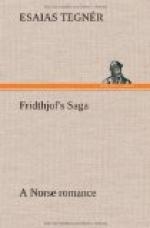and like the shining spirit soars on wings of light
to heaven, to God who mgve it.” See Norse
mythology, p. 294. BAUTA-stone.
A rough stone set up at warriors’ graves, and
having no inscription. Berserk (bear-coat).
The old Northern athletes or champions wore the skins
of bears, wolves or reindeer, and went into battle
with loud cries, wearing no armor. Berserk-gang.
The onset of the berserks. Bifrost (the
trembling way). The rainbow, the bridge of the
gods. Bjorn (a bear). Notice the play
upon this word in Canto X, p. 94: “Bjorn
attend the rudder,
Grip it with a bear’s paw.” Blood-eagle. When a foe deserved especial cruelty, he was put to death by carving the picture of an eagle on his back. see Canto XVI, p. 150. Brage. God of poesy: a son of Odin. Bran. Fridthjof’s dog. Breidablik (broad-gleaming). Balder’s abode. Burn salt. A common expression for making salt. Delling (day-spring). Dawn. Delling’s son. Day. Disarsal. The temple of the goddesses. Dragon. A war vessel. See description of Ellide, Canto III, p. 3O. Drapa. A funeral hymn, reciting the virtues of the deceased. Efje-sound. A sound in the Orkney Islands. Fafner. A son of Hreidmar and brother of Regin and Otter. Fafner and Regin demanded of their father a share of the gold obtained of Odin as Otter’s ransom. Hreidmar refused, and Fafner slew his father, and, taking all the gold. assumed the form of a dragon and fled. He concealed tho gold on Gnita heath, where he was found by Sigurd, who, at the instigation of Regin, slew Fafner. He accomplished this by digging a pit in Fafner’s path and concealing himself therein until the dragon passed over him, when he thrust his sword through Fafner’s heart. See Norse mythology, p. 377; also the story of the Volsungs and Niblungs, translated by Magnusson and Morris. Sweden, 1870. Fafner’s bane. The slayer of Fafner; Sigurd. Fenris. A wolf, and one of Loke’s children. Chained by the gods until Ragnarok, he gets loose and conquers Odin, but is himself slain hy Vidar. Folkvang (the folk-field). Freyja’s dwelling. Forsete (the presider). Son of Balder and Nanna. The god of justice. Foster-brother. It was customary in the North, when two persons entered into friendship for life and death, or, as it was called, foster-brothership, that each wounded himself and allowed his blood to mingle with the other’s. See, concerning Fridthjof and Bjorn, Canto III, p. 34. Frey (a lord). The god of harvests: the dispenser of wealth. Freyja. Frey’s soster, and goddess of love. Frigg. The wife of Odin and mother of Balder. FUTHORC. The runes taken collectively are properly called the futhorc, the word being made up of the names of the first of the runes. Compare “alphabet”.
Grip it with a bear’s paw.” Blood-eagle. When a foe deserved especial cruelty, he was put to death by carving the picture of an eagle on his back. see Canto XVI, p. 150. Brage. God of poesy: a son of Odin. Bran. Fridthjof’s dog. Breidablik (broad-gleaming). Balder’s abode. Burn salt. A common expression for making salt. Delling (day-spring). Dawn. Delling’s son. Day. Disarsal. The temple of the goddesses. Dragon. A war vessel. See description of Ellide, Canto III, p. 3O. Drapa. A funeral hymn, reciting the virtues of the deceased. Efje-sound. A sound in the Orkney Islands. Fafner. A son of Hreidmar and brother of Regin and Otter. Fafner and Regin demanded of their father a share of the gold obtained of Odin as Otter’s ransom. Hreidmar refused, and Fafner slew his father, and, taking all the gold. assumed the form of a dragon and fled. He concealed tho gold on Gnita heath, where he was found by Sigurd, who, at the instigation of Regin, slew Fafner. He accomplished this by digging a pit in Fafner’s path and concealing himself therein until the dragon passed over him, when he thrust his sword through Fafner’s heart. See Norse mythology, p. 377; also the story of the Volsungs and Niblungs, translated by Magnusson and Morris. Sweden, 1870. Fafner’s bane. The slayer of Fafner; Sigurd. Fenris. A wolf, and one of Loke’s children. Chained by the gods until Ragnarok, he gets loose and conquers Odin, but is himself slain hy Vidar. Folkvang (the folk-field). Freyja’s dwelling. Forsete (the presider). Son of Balder and Nanna. The god of justice. Foster-brother. It was customary in the North, when two persons entered into friendship for life and death, or, as it was called, foster-brothership, that each wounded himself and allowed his blood to mingle with the other’s. See, concerning Fridthjof and Bjorn, Canto III, p. 34. Frey (a lord). The god of harvests: the dispenser of wealth. Freyja. Frey’s soster, and goddess of love. Frigg. The wife of Odin and mother of Balder. FUTHORC. The runes taken collectively are properly called the futhorc, the word being made up of the names of the first of the runes. Compare “alphabet”.




